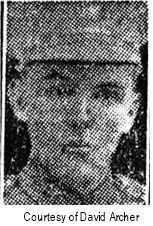|
Jun 29, 1897
|
Born in Toronto, Ontario to George and Louisa
Douglas
|
|
Aug 10, 1915
|
Attested into the 83rd Battalion CEF
in Toronto, Ontario
Ø Number 171072
Ø Next of kin given as George
Douglas, father, 309 Merton St., Toronto, Ontario
Ø Previous occupation given as
Bank Clerk
Ø No previous military
experience given
Ø Religion given as Presbyterian
Ø Posted to the 1st Regimental
Draft
On attesting, he stated his birth year was 1894,
not his actual birth year of 1897
Initial training was carried out at the Niagara
Camp, Niagara-on-the-Lake from August 1915 to April 25, 1916 when the
battalion moved to the Riverdale Barracks in Toronto
|
|
Sep 25, 1915
|
The 1st Regimental Draft embarked the
SS Corsican in Montreal, Quebec
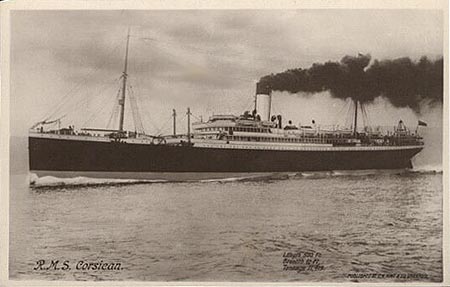
|
|
Oct 6, 1915
|
Disembarked in Plymouth, England and proceeded to
Shorncliffe where the draft was absorbed into the 39th Reserve
Battalion to continue training
|
|
Jan 18, 1916
|
Admitted to the Shorncliffe Military Hospital in
Shorncliffe with a diagnosis that reads VDG (Venereal Disease Gonorrhea)
|
|
Jan 19, 1916
|
Transferred to the Barnwell Hospital in Cambridge
|
|
Apr 6, 1916
|
Discharged to duty and rejoined the 39th
Reserve Battalion in West Sandling
|
|
Jun 6, 1916
|
Transferred to the 21st Battalion
|
|
Jun 7, 1916
|
Arrived at the DBD (Canadian Base Depot) in the
Rouelles Camp, Havre, France and Taken On Strength the 21st
Battalion
|
|
Jun 10, 1916
|
After leaving the base depot, Private Douglas
joined the 21st Battalion resting in Dickebusch, Belgium and was
posted to “D” Company
|
|
Jul 23, 1916
|
While in the front line trench near Voormezeele,
Belgium, Private Douglas received a bullet wound to his back and was
evacuated to the No. 6 CFA (Canadian Field Ambulance) for first aid before
being transported to the No. 10 CCS (Casualty Clearing Station)
|
|
Jul 24, 1916
|
Transferred to the No. 3 Canadian General
Hospital in Boulogne, France where surgery was performed to remove a bullet
from his back
|
|
Jul 26, 1916
|
Invalided to England aboard the Hospital Ship Cambria
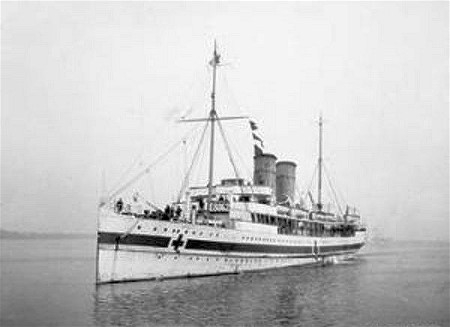
On arrival in England, he was admitted to the
Edmonton Military Hospital in London
Transferred to the CCAC (Canadian Casualty
Assembly Centre) for pay purposes while in hospital
|
|
Aug 29, 1916
|
Transferred to the Military Convalescent Hospital in Woodcote
Park, Epsom
|
|
Sep 18, 1916
|
Discharged from hospital and transferred to the
39th Reserve Battalion in West Sandling
|
|
Oct 19, 1916
|
Admitted to the Shorncliffe Military Hospital
with a diagnosis that reads Venereal Disease Gonorrhea and for continuing
treatment of his back wound
|
|
Dec 7, 1916
|
Transferred to the 64th Battalion
while in hospital
|
|
Dec 18, 1916
|
Discharged to duty with the 64th
Battalion in West Sandling
|
|
Feb 3, 1917
|
Sentenced to 7 days Field Punishment No. 2 for
being AWL (Absent Without Leave) for 4 days
|
|
Feb 28, 1917
|
Transferred to the newly formed 6th
Reserve Battalion in East Sandling while in hospital. Shortly after the battalion’s formation, it
moved to Seaford to train reinforcements for the front
|
|
Mar 19, 1917
|
Discharged from hospital and joined the 6th
Reserve Battalion
|
|
Apr 21, 1917
|
Admitted to the Military Convalescent Farm in
Warlingham for ongoing treatment of his Gonorrhea infection
Transferred to the EORD (Eastern Ontario
Regimental Depot) for pay purposes while in hospital
|
|
Sep 22, 1917
|
Transferred to the Canadian Convalescent Hospital
in Woodcote Park, Epsom
|
|
Nov 5, 1917
|
Discharged to duty from hospital
|
|
Nov 29, 1917
|
Admitted to the No. 14 Canadian General Hospital
in Eastbourne with an Abscess
|
|
Dec 18, 1917
|
Discharged from hospital and attached to the 3rd
CCD (Canadian Command Depot) for physical training and exercise at St.
Leonards on Sea
|
|
Jan 11, 1918
|
Admitted to the No. 14 Canadian General Hospital
in Eastbourne with a diagnosis that reads Haemorrhoids
|
|
Jan 30, 1918
|
Ceased to be attached to the 3rd
Canadian Command Depot
|
|
Feb 28, 1918
|
Transferred to the Eastern Ontario Regimental
Depot for pay purposes while in hospital
|
|
Mar 14, 1918
|
Surgery performed to remove his Haemorrhoids
|
|
May 28, 1918
|
A second surgery performed to relieve his
discomfort from Haemorrhoids
|
|
Jun 1, 1918
|
Discharged from hospital and attached to the 3rd
CCD (Canadian Command Depot) for physical training and exercise at St.
Leonards on Sea
|
|
Jul 2, 1918
|
Ceased to be attached and joined the Eastern
Ontario Regimental Depot in Seaford
|
|
Jul 6, 1918
|
Attached to the No. 14 Canadian General Hospital
in Eastbourne for duty
|
|
Nov 20, 1918
|
Admitted to the No. 14 Canadian General Hospital with
a diagnosis that reads Influenza
|
|
Nov 26, 1918
|
Discharged from hospital and resumed duties in the
hospital
|
|
Feb 12, 1919
|
Transferred to the CAMC (Canadian Army Medical
Corps) and posted to the No. 14 Canadian General Hospital in Eastbourne for
duty
|
|
Mar 29, 1919
|
Admitted to the No. 14 Canadian General Hospital
in Eastbourne for ongoing treatment of his Gonorrhea infection
|
|
Apr 1, 1919
|
Transferred to the Canadian Special Hospital in Etchinghill,
Lyminge
|
|
Apr 18, 1919
|
Transferred to the CAMCD (Canadian Army Medical
Corps Depot) for pay purposes while in hospital
|
|
Jun 6, 1919
|
Discharged to duty from hospital
|
|
Jun 12, 1919
|
Transferred to “P” Wing at the CCC (Canadian
Concentration Camp) in Witley pending return to Canada
|
|
Jul 3, 1919
|
Embarked the Empress of Britain in Liverpool
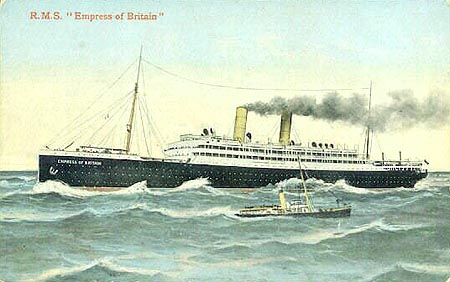
|
|
Jul 11, 1919
|
Disembarked in Quebec City, Quebec and proceeded
to Toronto, Ontario
|
|
Jul 12, 1919
|
Discharged from the CEF in Toronto, Ontario
Ø Rank on discharge Private
Ø War Service Badge Class “A”
issued number 223663
Ø Proposed residence on
discharge 309 Merton St., Toronto, Ontario
Following his discharge, the British War Medal
and Victory Medals were sent to him at 309 Merton St., Toronto, Ontario
|
|
Oct 30, 1926
|
Married to Hannah Ivy Rita Newell in Toronto,
Ontario
|
|
Jun 19, 1930
|
Clarence Churchill Douglas died in Toronto,
Ontario and was buried in the Mount Pleasant Cemetery in Toronto
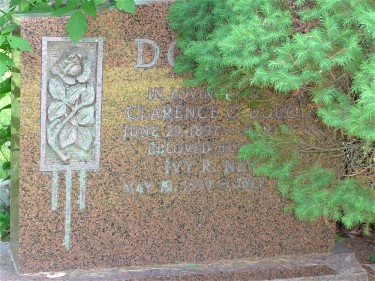
|
